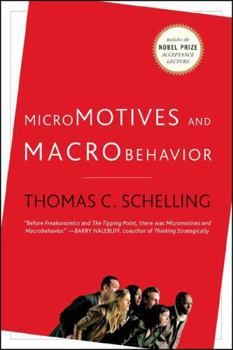Micromotives and Macrobehavior
Select Format
Select Condition 
Book Overview
"Schelling here offers an early analysis of 'tipping' in social situations involving a large number of individuals." --official citation for the 2005 Nobel Prize Micromotives and Macrobehavior was originally published over twenty-five years ago, yet the stories it tells feel just as fresh today. And the subject of these stories--how small and seemingly meaningless decisions and actions by individuals often lead to significant unintended...
Format:Paperback
Language:English
ISBN:0393329461
ISBN13:9780393329469
Release Date:October 2006
Publisher:W. W. Norton & Company
Length:288 Pages
Weight:0.57 lbs.
Dimensions:0.7" x 5.6" x 8.2"
Customer Reviews
5 ratings
Great Supplement to an Applied Econ Course
Published by Thriftbooks.com User , 22 years ago
Schelling explains the world of externalities with fun examples, supported by economic logic and mathematical models. Economists describe externalities as non-optimal market solutions that arise from individuals making decisions in their own self-interest. These are interesting because most of economics deals with describing how Adam Smith's "invisible hand," individuals acting in their own self-interest, produces efficient market solutions. Notable examples of externalities are pollution, traffic congestion, and education. Education is a positive externality, while the former two are negative externalities.Although you don't have to be a mathematician or economist to understand Schelling's writing, those who aren't may get bored with the litany of mathematical possibilities that he uses to explain why some models help explain much of the phenomena he discusses. Barring that criticism, many of his examples entice the reader to think about things in a new light. For example, why do audiences tend to sit in the middle or rear seats and not up front during performances or why do we suffer from traffic congestion? The author describes how the overall result of too much traffic or empty seats in the front rows occurs from the numerous individual decisions people make on where to sit or drive. Thus, if the front ten rows in an auditorium were empty, everyone would be better off moving forward ten rows. Nothing would change in their relative positions in the audience, but everyone could hear better. Why doesn't this occur? Read Micromotives and Macrobehavior to find out.As an economics instructor, I would consider using this book as a supplement to a course in applied economics (or mathematics). Schelling's writing could help interest student's in the subject matter of externalities more than many of the textbooks on the market. Great read!
Brain food! One of the best books for the analytical mind
Published by Thriftbooks.com User , 23 years ago
Schelling's Micro Motives and Macro Behavior is food for the hungry brain. It's written for everyday folks who don't have a background in economics, but are willing to experiment. I'd recommend it for anyone who is studying the social sciences--especially if you're trying to understand where people come up with all these theories about politics, behavior, and the human world at large. Reading Schelling is like watching a favorite TV show. His prose is delightful, his selection of examples is easy for anyone to relate to (like buying lemons or adjusting a thermostat), and the way he writes, you forget that your brain is getting an intellectual workout. This book is positively sublime. You can read through it, cover to cover, in no time at all, and it's not until the end that you'll realize that you've been training your mind in positive economic theory --without the jargon, the mind-boggling graphs and charts, the formal models, the calculus, the supply and demand curves and all that googley-gunk that comes with most any primer on economics. Schelling's work is not just a classic, it's a masterpiece! And you don't need to be an economist or a doctoral candidate to appreciate it.
Good for the right audience
Published by Thriftbooks.com User , 24 years ago
I agree with Pierce Inverarity's remarks about this book not being too ground-breaking micro-economics. But the book is still splendid reading for the right audience. When I gave the book five stars, it was not as an economist (yes, I also heard it all in the first weeks on the introductory course in micro-economics). The book is splendid because it teaches a basic economic world-view in a way which can engage people who are utterly uninterested in this kind of thinking.
Makes you want to be an economist
Published by Thriftbooks.com User , 24 years ago
Have you ever been in one of those situations where you want to behave just like everyone else (dress-code at dinner parties, crossing the street in spite of red light, going to a hip club instead of a deserted) or NOT behaving just like everyone else (going to exotic countries and empty beaches, buying undervalued stocks) -- of course you have. Life is made of it. Schelling starts with simple situations like these and shows how important social problems can be modelled and understood from them. It is the same basic principles at work! The result is splendid, insightful and very useful for all kind of analysis, both in academic and in private life. Schelling has a lovely way of writing. I have just cruised through a hundred pages without noticing the clock. Then I figured I probably should give this book a favourable review. You do not have to be an economist to enjoy this book, although you might want to become one after you have read it.
An economics course in human behavior.
Published by Thriftbooks.com User , 26 years ago
This author convinces the reader that individual actions often lead to surprising results in the aggregate. This is not some boring economic lecture but an interesting survey covering broad concepts like segregation and free choice. This book is not to be overlooked.





